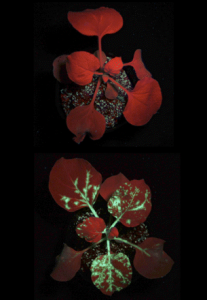Lost in domestication? Discovery of lectin-mediated immunity that impairs virus infection in plants

Plants have evolved a highly-advanced innate immune system. For example, when a virus enters a plant cell, specific resistance genes for that pathogen are activated and trigger a variety of immune responses at the cellular, tissue and organism-wide levels, including secretion of resistance compounds and localized cell death.

The PlAMV potexvirus was tagged with a fluorescent green marker to measure spread of infection. The image shows virus infection in a wild-type plant (bottom) and inhibition of infection in a transgenic plant expressing JAX1 (top).
Yasuyuki Yamaji et al., "Lectin-Mediated Resistance Impairs Plant Virus Infection at the Cellular Level" The Plant Cell, February 2012 vol. 24 no. 2 778-793. Copyright American Society of Plant Biologists.
On the other hand, it is well known that lectins, a class of proteins, act in humans and other animals to prevent the accumulation of some viruses including HIV. However, even though it is known that large numbers of lectins exist in plants, their role in plant defense remained unclear.
A group led by Assistant Professor Yasuyuki Yamaji and Professor Shigetou Namba at the University of Tokyo’s Graduate School of Agricultural and Life Sciences has shown for the first time that a plant lectin provides viral resistance. Additionally, the group has also demonstrated that plants have a novel lectin-based immune system that works by a different mechanism to the known plant immune system.
The lectin is coded for by a gene which the team has named JAX1, and which confers immunity to multiple viruses of a group that affects many commercially-important crops. In addition, JAX1 conferred immunity even when the known plant immune system was suppressed, demonstrating that it works through an unknown mechanism.
“With our focus on improving quality and yield during the process of crop domestication, we may have inadvertently lost these wild-type genes that provide powerful and broad resistance,” suggests Professor Namba. Given the great variety of lectins in plants, there may exist other lectin genes providing broad resistance against other groups of pathogens. This discovery may lead to revolutionary new means of improving plants’ natural defenses and reducing crop loss to disease, and as fundamental research is a major advance in our understanding of plant immunity.
(Public Relations Division: Euan McKay, Azusa Minamizaki)
Department release/press release (Japanese)
Paper
Yasuyuki Yamaji, Kensaku Maejima, Ken Komatsu, Takuya Shiraishi, Yukari Okano, Misako Himeno, Kyoko Sugawara, Yutaro Neriya, Nami Minato, Chihiro Miura, Masayoshi Hashimoto and Shigetou Namba,
“Lectin-Mediated Resistance Impairs Plant Virus Infection at the Cellular Level,”
The Plant Cell, February 2012 tpc.111.093658, doi:10.1105/tpc.111.093658
Article link
Links
Graduate School of Agricultural and Life Sciences







